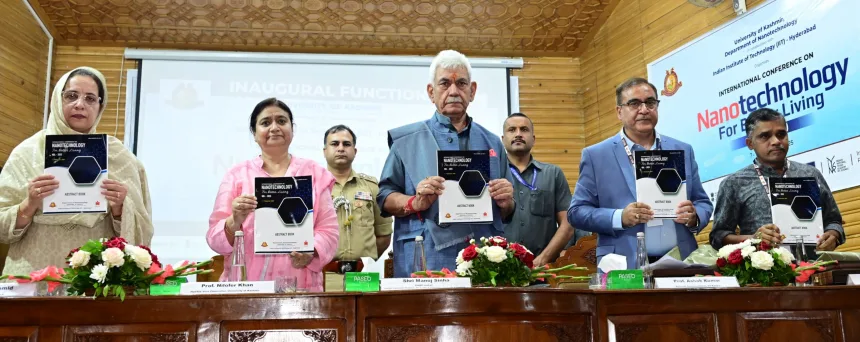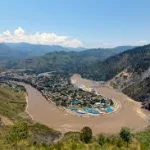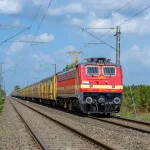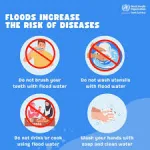Srinagar, Sept 7: Lieutenant Governor Manoj Sinha on Sunday called for greater investment in research and innovation in nanotechnology, especially in areas related to climate change, disaster preparedness, and defence self-reliance.
Delivering the keynote address at the inaugural session of the International Conference on “Nanotechnology for Better Living (NBL-2025)” at the University of Kashmir, the Lt Governor urged scientists, researchers, and institutions to harness the transformative power of nanotechnology to tackle pressing global and regional challenges.
“Advancements in nanoscience are reshaping our lives and workspaces. In the near future, research in this field will be pivotal in addressing critical global challenges,” he said.
He emphasised the need for developing advanced early warning systems for flash floods and landslides in Jammu and Kashmir and the Himalayan region through highly sensitive nanotech sensors. He also called for creating nanomaterials that can reduce industrial pollution, especially in chemical manufacturing.
“Can we develop soil sensors specifically for the Himalayas? Can we constitute an expert group during this conference to assist states prone to natural disasters?” he asked the scientific community, urging them to take the lead in mission-driven innovation.
Lt Governor Sinha highlighted India’s global leadership in the field, stating that the country ranks second only to China in converting nanotechnology research into commercial applications. He lauded the development of nano-agri inputs such as nano-urea and nano-DAP, which have significantly contributed to sustainable agriculture.
“Very few people know that India’s first nano-urea was developed by IFFCO right here in Jammu and Kashmir,” he said, adding that these innovations have played a vital role in ensuring food security and reducing environmental impact.
The Lt Governor also spotlighted India’s biotechnology advancements, noting that nanotechnology was integrated into the development of COVID-19 vaccines. He said that innovations in medical nanotech are transforming healthcare delivery.
“Institutions like IIT-Mumbai have developed nano-carriers and nano-capsules that have significantly reduced the side effects of targeted therapies for cancer and other diseases,” he said.
“Today, nano-eye drops are being used to treat chronic dry eye disease, and nanofilters are removing microplastics, heavy metals, arsenic and fluoride from drinking water.”
He said nanotechnology is also powering breakthroughs in renewable energy, such as high-efficiency solar cells and next-generation batteries, and called for more research in regenerative medicine and advanced implants.
“Nanoscale transistors, nanoparticles, nanomaterials, and nanoscale additives are all innovations that will soon touch the lives of ordinary people,” he said.
Recalling past challenges in India’s defence sector, including during Operation Sindoor, Sinha said India is now exporting defence equipment to over 100 countries.
“After 2014, the Government of India opened up defence R&D to private players. Initiatives like iDEX – Innovations for Defence Excellence are creating new opportunities for nanotech experts to contribute to national security,” he said.
He urged scientists to develop lightweight nanotech-based components for defence applications and support India’s journey toward self-reliance.
The Lt Governor also called for a plan to incentivize talent in nanotechnology across academic institutions, emphasising the need to encourage young minds to explore and innovate in this emerging field.
“Our inventions and initiatives show how quickly we are progressing in various areas of nanotechnology. Let us ensure that the benefits of these advancements reach the common man,” he said.
The five-day International Conference on Nanotechnology for Better Living (NBL-2025) is jointly organised by the University of Kashmir and the Indian Institute of Technology (IIT) Hyderabad. It brings together leading scientists, researchers, industry experts, and policymakers to discuss recent advancements in nanotechnology and its role in achieving sustainable development.
On the occasion, the Lieutenant Governor also released the official abstract book of the conference.
Vice Chancellor, University of Kashmir, Prof. Nilofer Khan; Dean Academics, BRIC-InStem, Bangalore, Prof. Praveen K. Vemula; eminent Scientist from IIT Kanpur, Prof. Ashok Kumar; Head, Department of Nanotechnology, Kashmir University and Organizing Chair of the Conference, Prof. Rabia Hamid; scientists, experts, researchers and heads of educational institutions were present.
Divisional Commissioner Kashmir, Anshul Garg; DIG Central Kashmir Range, Rajiv Pandey; Deputy Commissioner Srinagar, Akshay Labroo; SSP Srinagar, Dr GV Sundeep Chakravarthy; Registrar, Kashmir University, Prof. Naseer Iqbal, scholars, faculty and students also attended the inaugural ceremony.






